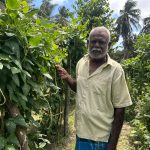In the quiet village of Pappamottai, nestled in the northern dry zone of Sri Lanka, lives Mr. S. A. Sebasthiyan—a 70-year-old farmer whose life is a remarkable story of resilience, love, and transformation.
Born into poverty and educated only up to Grade 5, Sebasthiyan’s early years were shaped by hardship. Yet amidst the struggles, his childhood was also filled with the simple joys of farming—a skill and passion handed down through generations.
A Life of Struggle and Strength; In his youth, Mr. Sebasthiyan endured multiple relocations due to the civil conflict, which upended both his personal life and his work on the land. Despite the turmoil, his love for farming never wavered. At the age of 30, he married the woman who would become his steadfast companion and greatest support. Together, they raised two children. But tragedy struck when they lost one during the war—a heartbreak that remains their deepest sorrow.
A New Beginning in Pappamottai: After years of displacement, the couple finally settled in Pappamottai in 2010. The land they found offered little more than a few coconut trees. But where others saw emptiness, Sebasthiyan and his wife saw promise.
“We didn’t have much,” he recalls, “but we had the soil due to 30 years’ Civil War. That was enough to start.”
Partnership That Changed Everything; In 2024, the couple’s life took a brighter turn when they joined the Caritas Valvuthayam Food Security community. This initiative is part of Caritas Sri Lanka’s Food Security Program, “Improving Rural Livelihoods, Enhancing Food Security, and Building Climate Resilience in Sri Lanka,” funded by Caritas Norway and implemented since January 2023.
Through the program, the Caritas Mannar Food Security Team raised awareness about the harmful effects of agrochemicals and trained participants in various organic farming techniques. These included methods for preparing compost fertilizer (heap system, pit system, “Jeewakotuwa” method, drum system, pipe system, bin system, and flower pot system), producing liquid fertilizers (such as fish tonic, fruit tonic, leaf extracts, and “Jeewamurtha”), and making vermicomposting and vermiwash. The team also taught the preparation of natural pest repellents using tobacco, onion, margoza leaves, and the “3G solution” (garlic, ginger, and green chili).
Through training programs, equipment support, and—most importantly—the introduction of a micro-irrigation system, Caritas empowered the Sebasthiyan family to maximize the potential of their farm.
With patience and dedication, they cultivated a thriving home garden filled with nutritious vegetables such as tomatoes, keera, green chilies, long beans, brinjals, and a variety of leafy greens. Their farm also includes cattle and poultry, forming a small but complete demonstration model of sustainable agriculture. They continue to practice environmentally friendly farming techniques consistently.
“Caritas gave us more than just tools,” Mr. Sebasthiyan shared. Now earning between LKR 20,000 and 25,000 per month, the farm has become both a reliable source of income and a living legacy. More than just a place of cultivation, it stands as a model farm and a source of inspiration for the Pappamottai community.
Mr. Sebasthiyan’s story is a reminder that even the hardest soil can bear fruit when nurtured with love, patience, and support. His journey reflects not only personal triumph but also the transformative power of community and shared growth.
Caritas Valvuthayam Mannar remains committed to uplifting rural families like the Sebasthiyans—ensuring that knowledge, dignity, and opportunity reach every corner of the land.
Mr. Sebasthiyan gratefully acknowledges the support received from Caritas Sri Lanka – SEDEC through Caritas Norway.
“Farming is not just work. It’s our life, our pride, and our peace.” – Mr. S.A. Sebasthiyan








